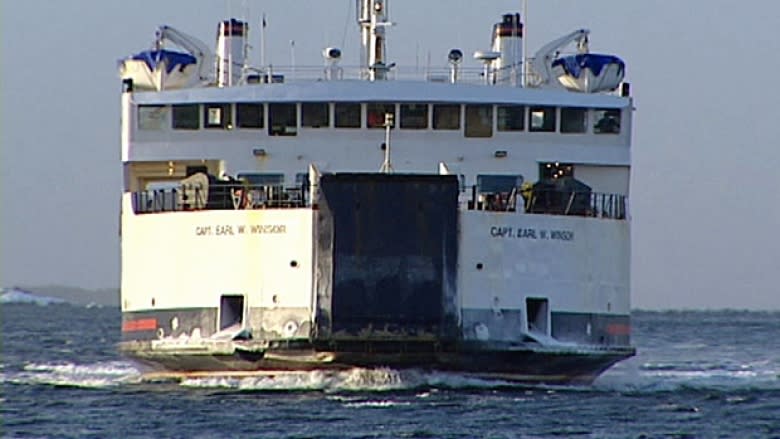Truck driver narrowly escapes Fogo Island-Change Islands ferry accident
A truck driver managed to escape unharmed from his sinking vehicle, after it slid into the water during ferry unloading at Change Islands in Newfoundland and Labrador.
Dean Snow said the trouble started around 6 p.m. NT on Monday as he began driving his truck, loaded with sand for snow clearing, off the MV Capt. Earl W. Winsor's ramp to the wharf.
Underneath him, the boat began drifting off the wharf, due to a loosely tied rope, according to Snow.
"When I looked, the rope was slack from the boat to the wharf, and the boat kept moving off," he told CBC News.
Within moments, the truck was in the water, sinking between the wharf and the ferry.
"I started hearing the lights busting out of the truck … so I jumped out through the window, and jumped out on the fender, and jumped on the hood of the truck," said Snow.
"I slipped, and I almost fell in the water."
Snow said his truck continued to sink, as its hood became level with the end of the wharf.
"I thought I was gone. I didn't think there was any chance."
Icy rescue
Snow said a ferry worker was standing nearby on the wharf, and reached out his hands to help.
"He was pretty afraid, because the wharf was pretty slippery and the ramp wasn't salted or nothing. It was nothing, only one sheet of ice."
But, he said, the worker managed to grab hold of Snow as he jumped out onto that icy wharf — and just in time.
"The dump truck went down, all the way," said Snow. "She's on the bottom."
Snow said there is now only a glimpse of his truck visible through the choppy sea ice on the surface, with some oil leaking from its remains.
'It shouldn't have happened'
Snow believes the accident could have been prevented, and summed up the frightening evening in one word: "careless."
"A lot of times they come in here and they only throws out one rope [from the ferry to the wharf] instead of putting out two, three ropes."
Snow said the rope thrown to secure the ferry was too slack to be of any use.
"They never tightened up the rope, so the boat just slid. If you put a slack rope on a boat, you know what you got — she's gonna move."
Snow said he has insurance to cover the truck, although it will be tight to manage his snow-clearing operations during the busy season without it.
The province's Occupational Health and Safety and the Department of Environment, the RCMP and Transport Canada have been notified of the accident.
For Snow, he hopes such a brush with death like his never happens again.
"It could be prevented, right?"
Province's response
In the hours after the accident, the Department of Transportation and Works, which oversees Newfoundland and Labrador's ferry services, began its investigation and notified Transport Canada, the RCMP, and the province's Department of Environment and Occupational Health and Safety.
Transportation Minister Al Hawkins said it's too early to tell what, if any, role slack or improperly used ropes played.
"That will be part of the investigation," said Hawkins, adding Snow will be involved in the process.
"Safety is number 1 for us."
In the meantime, Snow's truck must be recovered, as it could be leaking contaminants into the ocean.
"That's a concern that we have. There may be some fuel in the truck that could possibly contaminate some of the water there, so we want to make sure that we mitigate any chances of that spreading," Hawkins told CBC News.
"We need to get a crane over to Change Islands. We need to get divers in the water to determine the location and position of the truck, and then we will put a plan in place to have the truck removed from the water."
Ferry service down
The Capt. Earl W. Winsor will nolt be running for the time being.
"What we need now is a technical assessment done of the Winsor to determine whether in fact it's safe to sail," said Hawkins, who could not say if any damage had been done to the vessel.
The Winsor is itself an interim replacement vessel for the Veteran, a $50-million boat that is now being repaired for the third time since it began the Fogo-Change Islands service in October 2015.
Hawkins said once the damage has been assessed on the Winsor, the province will either put it back into service or arrange for helicopter or fixed-wing flights to re-connect people on Fogo Island and Change Islands with Newfoundland on a short-term basis.
In a news release, the Department of Transportation and Works said crews will remove the truck from the water, and a preliminary investigation into the accident has begun.
Damage to the ferry's ramp is also being assessed, with no timeline on when the boat will be back in service.
Air service will be arranged if it's necessary, said the department, with updates to come on its website.




